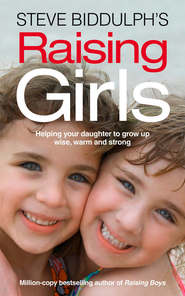По всем вопросам обращайтесь на: info@litportal.ru
(©) 2003-2024.
✖
Raising Boys: Why Boys are Different – and How to Help them Become Happy and Well-Balanced Men
Автор
Год написания книги
2019
Настройки чтения
Размер шрифта
Высота строк
Поля
2 The first stage of boyhood is from birth to six, the span of time when – in most families – the boy primarily belongs to his mother. He is ‘her’ boy, even though his father may play a very big role, too. The aim at this age is to give strong love and security and to ‘switch a boy on’ to life as a warm and welcoming experience.© Lopolo/Shutterstock.com
3 The second stage includes the years from six to fourteen – when the boy, out of his own internal drives, starts wanting to learn to be a man and looks more and more to his father for interest and activity (although his mother remains very involved, and the wider world is beckoning, too). The purpose of this stage is to build competence and skill while also developing kindness and playfulness – you help him to become a balanced person. This is the age when a boy becomes happy and secure about being male.© Monkey Business Images/Shutterstock.com
4 Finally, the years from fourteen to adult – when the boy needs input from male mentors if he is to complete the journey to being fully grown-up. Mum and Dad step back a little, but they must organise some good mentors in their son’s life; if not, he will have to rely on an ill-equipped peer group for his sense of self. The aim is for your son to learn skills, responsibility and self-respect by joining more and more with the adult community.
These stages do not indicate a sudden or sharp shift from one parent to another. It’s not like the mum stage, the dad stage and the mentor stage. For instance, an involved dad can do a huge amount from birth onwards, or even take the role a mother usually has if need be. And a mother doesn’t quit when a boy reaches six – quite the opposite. The stages indicate a shift in emphasis: the father ‘comes to the fore’ more from six to thirteen, and the importance of mentors increases from fourteen onwards. In a sense, it’s about adding new ingredients at each stage.
The three stages help us know what to do. For example, we know that fathers of boys from six to fourteen must not be just busy workaholics, or absent themselves emotionally or physically from the family. If they do, this will certainly damage their sons. (Yet most fathers of the twentieth century did just that – as many of us can remember from our own childhood.)
The stages tell us that we must look for extra help from the community when our sons are in their mid-teens – the role that used to be taken by extended family members (uncles and grandfathers) or by the tradesman–apprentice relationship. Too often, teenagers move outwards into the big world but no one is there to catch them, and they spend their teens and early adulthood in a dangerous halfway stage, with only peers to depend on.
It’s a fair bet that many problems with boys’ behaviour – poor school motivation, depression, young men getting into trouble with the law (drink-driving, fights, crime, etc.) – have escalated because we haven’t known about these stages and provided the right human ingredients at the right times.
The stages are so important that we must look at each of them in more detail and decide how to respond. That’s what we’ll do now.
From Birth to Six: The Gentle Years
Babies are babies. Whether they are a boy or girl is not a concern to them, and needn’t be to us, either. Babies love to be cuddled, to play, to be tickled and to giggle; to explore and to be swooshed around. Their personalities vary a lot. Some are easy to handle, quiet and relaxed, and sleep long hours. Others are noisy and wakeful, always wanting some action. Some are anxious and fretful, needing lots of reassurance that we are there and that we love them.
© The Light Photography/Shutterstock.com
What all babies and toddlers need most is to form a special bond with at least one person. Usually this person is their mother. Partly because she is the one who is most willing and motivated, partly because she provides the milk, and partly because she tends to be cuddly, restful and soothing in her approach, a mother is usually the best equipped to provide what a baby needs. Her own hormones (especially prolactin, which is released into her bloodstream as she breastfeeds) prime her to want to be with her child and to give it her full attention.1 (#litres_trial_promo)
Except for breastfeeding, dads can provide all a baby needs. But dads tend to do it differently: studies show them to be more vigorous in their playing2 (#litres_trial_promo) – they like to stir children up, while mothers like to calm them down (although if fathers get as deprived of sleep as mothers sometimes do, they too will want to calm baby down!).
Learning to Love
If a mother is the main caregiver, a boy will see her as his first model for intimacy and love. If she builds this close bond, then from toddlerhood on – if she sets limits with her son firmly but without hitting or shaming him – he will take this in his stride. He will want to please her, and will be easier to manage because the attachment is so strong. He knows he has a special place in her heart. Being made to wait or to change his behaviour might baffle him, but he will get over it. He knows he’s loved, and he will not want to displease the person at the centre of his existence.
Mum’s interest and fun in teaching and talking to him helps his brain to develop more verbal skills and makes him more sociable. Boys need more help than girls to catch on to social skills (more on this later).
If a mother is terribly depressed, and therefore unresponsive in the first year or two of her son’s life, his brain may undergo physical changes and become a ‘sad brain’.3 (#litres_trial_promo) If she is constantly angry, hitting or hurting him, he will be confused over whether she loves him. (Please note, this is constant anger we are talking about, not occasional rattiness that all parents feel and show. We aren’t supposed to be angels as parents – if we are, how would our children learn about the real world?)
Those of us who are around young mothers have to be careful to support and help them, to ensure they are not left isolated or overwhelmed with physical tasks. A mother needs others to augment her life so she can relax and do this important work. If we care for young mothers, they can care for their babies. Husbands and partners are the first rank of help, but family and neighbours are also needed.
What Goes On Between Mother and Baby Boy?
Science has trouble measuring something like love, but it’s getting better. Scientists studying mothers and babies have observed what they call ‘joint attention sequences’. This is love in action, love you can see. You will have certainly experienced this with your own child. The baby seeks out your attention with a gurgle or cry. You look towards him and see that he is looking at you. He is thrilled to make eye contact, and wiggles with delight. You talk back to him. Or maybe you are holding him or changing him, and you feel that closeness as you sing to or tickle him. He impacts on you, and you on him. The exchange goes on, a ‘pre-words’ conversation – it’s delightful and warm. Researchers filmed mothers and babies going about their day, and discovered that joint attention sequences happen between 50 and 100 times a day.4 (#litres_trial_promo) This is where the ability to relate to others skilfully and sensitively is first learnt.
Another kind of joint attention sequence is when a child is distressed and you croon, stroke or hold him gently, and distract him – you care for him based on your growing experience of what works to help him calm down. Or you engage with him just to enjoy seeing him become happy or excited. Soon your ‘joint attention’ might be directed at a toy, a flower, an animal or a noise-making object that you enthuse about together. You are teaching him to be interested in his world.
This is one of the most significant things a parent ever does for their baby. Inside baby’s little head, his brain is sprouting like broccoli in the springtime. When a baby is happy, growth hormone flows through his body and right into his brain, and development blossoms. When he is stressed, the stress hormone – cortisol – slows down growth, especially brain growth. So interaction, laughter and love are like food for a baby’s brain. All this interaction is being remembered in these new brain areas: the baby is learning how to read faces and moods, be sensitive, and learn calmness, fun, stern admonition or warm love. Soon he will be adding language, music, movement, rhythm and, above all, the capacity for feeling good and being empathic with other people. Boy babies are just a little slower, a little less wired for sociability than girls, and so they especially need this help. And they need it from someone who knows them very well, who has the time and who is themselves reasonably happy and content.
The process keeps going right into little-boyhood. A mother shows delight when her child makes mud pies, and admires his achievements. His father tickles him and play-wrestles with him, and is also gentle and nurturing, reading stories and comforting him when he is sick. The little boy learns that men are kind as well as exciting, that dads read books and are capable in the home; and that mothers are kind but also practical, and part of the bigger world.
In Short
To sum up, the first lessons boys need to learn are in closeness – shown through trust, warmth, fun and kindness. Under six years of age, gender isn’t a big deal, and it shouldn’t be made so. Mothers are usually the primary parent, but a father can also take this place. What matters is that one or two key people love the child and make him central for these few years. That way, he develops inner security for life, and his brain acquires the skills of intimate communication and a love of life and the world. These years are soon over. Enjoy your little boy while you can!
From Six to Fourteen: Learning to Be Male
At around six years of age, a big change takes place in boys. There seems to be a ‘switching on’ of boys’ masculinity at this age. Even boys who have not watched any television suddenly want to play with swords, wear Superman capes, fight and wrestle and make lots of noise.5 (#litres_trial_promo) Something else happens that is really important: it’s been observed in all societies around the world. At around six years of age, little boys seem to ‘lock on’ to their dad, or stepdad, or whichever male is around, and want to be with him, learn from him and copy him. They want to study how to be male.
If a dad ignores his son at this time, the boy will often launch an all-out campaign to get his attention. Once I consulted in the case of a little boy who repeatedly became seriously ill for no apparent reason. He was placed in intensive care. His father, a leading medical specialist, flew back from a conference overseas to be with him, and the boy got better. The father went away to another conference, and the illness came back. That’s when they called in the psychologists. We asked the father to reconfigure his lifestyle, which involved being on the road for eight months a year. He did this, and the boy has not been ill since.
Boys may steal, break things, act aggressively at school and develop any number of problem behaviours just to get Dad to take an interest. But if Dad is already in there on a daily basis playing, teaching and caring for his son, then this stage will go smoothly.
Mums Still Matter Just as Much
This sudden shift of interest to the father does not mean that Mum leaves the picture. In the past, in North America and the UK especially, mothers would often distance themselves from their boys at this age, to ‘toughen them up’. (This was also the age that the British upper classes sent their boys to boarding school.) But as Olga Silverstein has argued in her book, The Courage to Raise Good Men,6 (#litres_trial_promo) this often backfired. If, in the early years, a mother suddenly withdraws her presence or her warmth and affection, then a terrible thing happens: the boy, to control his grief and pain, shuts down the part of him that connects with her – his tender and loving part. He finds it just too painful to feel loving feelings if they are no longer reciprocated by his mother. If a boy shuts down this part of him, he will have trouble as an adult expressing warmth or tenderness to his own partner or children, and will be a rather tense and brittle man.7 (#litres_trial_promo) We all know men like this (bosses, fathers, even husbands) who are emotionally restricted and awkward with people. We can make sure our sons are not like this by hugging them, talking to them, listening to their feelings, whether they are five, ten or fifteen.
© Darren Baker/Shutterstock.com
Mothers have to stay constant, while being willing to let Dad also play his part. Boys need to know they can count on Mum, in order to keep their tender feelings alive. Things work best if they can stay close to Mum, but add Dad, too. If a dad feels a child is too taken up with his mother’s world (which can happen), he should increase his own involvement – not criticise the mother! Sometimes a dad is too critical or expects too much, and the boy is afraid of him. A father might have to learn to be more thoughtful, gentler, or just more fun, if his son is to successfully cross the bridge into manhood with him.
The six- to fourteen-year-old boy still adores his mother, and has plenty to learn from her. But his interests are changing – he is becoming more focused on what men have to offer. A boy knows that he is turning into a man. He has to ‘download the software’ from an available male to complete his development.
The mother’s job is to relax about this, and stay warm and supportive. The father’s job is to progressively step up his involvement. If there is no father around, then the child depends more on finding other men – at school, for instance.
PRACTICAL HELP
WHAT TO DO IF YOU’RE A SINGLE MOTHER
For thousands of years, single mothers have needed to raise boys without a man in the house. And more often than not, these boys have turned out just great. Please take this on board right away – mums on their own can raise fine men.
Over the years I have interviewed mothers who did this, to find out their secret. Successful single mothers of sons always give the same advice. Firstly, they found good male role models, calling in help from uncles, good friends, schoolteachers, sports coaches, youth leaders and so on (choosing with care to guard against the risk of sexual abuse). A boy needs to know what a good man looks like. If caring men are involved enough, and over a sufficiently long period of time, this provides that one missing thing a mother can’t give – a male example to copy. If there are one or two good men who know and care about your son, it makes a huge difference. (It’s the same if you are in a two-mother family, raising a boy. There will be men in your social circle who are the kind of man you would want your son to emulate. Ask them to get involved.)
Single mums can also comfort themselves that, after all, many boys with dads only see them for basically a few minutes a day. Whatever you do, don’t marry some deadbeat just so your son can have a man in the house!
Part of the survival kit of single mothers is the network(s) of good men in their community. If you are a dad, your son will certainly have friends who don’t have a dad present or whose dad is not very involved. Think about inviting that boy when you plan a trip to a concert, the beach, a sports game or a weekend away with your own son. His mum will be so appreciative, though she would never have asked for this, not wanting to impose. (She may be a little cautious, so perhaps don’t start with a nine-day wilderness trek.)
Single parents need to be networked. Being involved in a community group, church, sporting or hobby group, extended family, or just a neighbourhood where kids are loved and valued is a natural way to provide other good adult role models and people to bounce off, especially in adolescence.
There’s one more thing. All the successful single parents I’ve known also recognised they needed to be kind to themselves, and not become long-suffering martyrs. (Martyrdom is like yoghurt: it has a shelf life of maybe two weeks, then it tends to go kind of sour!) Single parents who did well planned into their lives a massage, a game of racquetball, a yoga class, or just time vegging out watching television when the children were asleep – and they kept this commitment to their own wellbeing. (For more help on single parenting, see here (#litres_trial_promo).)
PRACTICAL HELP
FIVE FATHERING ESSENTIALS
All fathers have one thing in common: they would like to be good dads. The problem is, if we weren’t given great fathering ourselves, and many of us weren’t, how do you turn good intentions into action? What if you just never got the ‘software’? The best way is to hang around other men and learn from what they do, see what you would copy and what you would never repeat! From talking to hundreds of men, here are five basic clues.
1 Start early. Be involved in the pregnancy – talk with your partner about your hopes for the child and your plans and dreams for how you want your family to be. Plan to be at the birth – and stick to the plan! Go to some birth classes, especially those just for fathers, which are being offered more and more. Once your baby is born, get involved in baby care right from the start. Have a speciality. Bathing is good: they are slippery little suckers, but it’s a fun time and a big help. This is the key time for relationship-building. Caring for a baby ‘primes’ you hormonally and alters your life priorities. So beware! Fathers who care for babies physically start to get fascinated and very in tune with them – it’s called ‘engrossment’. Men can become the expert at getting babies back to sleep in the middle of the night – walking them, bouncing, singing gently, or whatever works for you! Don’t settle for being useless around babies – keep at it, get support and advice from the baby’s mother and other experienced friends. And take pride in your ability. If you have a demanding career, use your weekends or holidays to get immersed in your child. From when your child is two, encourage your partner to go away for the weekend with her girlfriends and leave you and your toddler alone, so that both you and she know you are capable and can ‘do it all’. Try to clean up before she gets home – this really impresses spouses.
2 Make time. This is the bottom line, so listen closely. For fathers, this may be the most important sentence in this whole book: if you routinely work a fifty-five- or sixty-hour week, including commute times, you just won’t cut it as a dad. Your sons will have problems in life, your daughters will have self-esteem issues, and it will be down to you. Fathers need to get home in time to play, laugh, teach and tickle their children. Corporate life, and also small business, can be enemies of the family. Often fathers find the answer is to accept a lower income and be around their family more. Next time you’re offered a promotion involving longer hours and more nights away from home, seriously consider telling your boss, ‘Sorry, my kids come first.’
3 Show your love. Hugging, holding and playing tickling and wrestling games can take place right through to adulthood! Do gentler things, too – kids respond to quiet storytelling, sitting together, singing or playing music. Tell your kids how great, beautiful, creative and intelligent they are (often, and with feeling). If your parents were not demonstrative, you will just have to learn. Some dads fear that cuddling their son will turn him into a ‘sissy’. In fact, the reverse is probably true. Sons whose dads are affectionate and playful with them will be closer to their fathers, want to emulate them more, and be comfortable in the company of men. For both sons and daughters, a dad’s affection is vital. A child can’t understand that you work long hours, worry over tax forms or scrimp and save for his future, because that’s not something he can see or touch. Kids know they are loved through touch and eye contact and laughter and fun. Affection is reassuring – it conveys love in a way that words cannot. Children who are hugged and kissed feel safer in the world, and when Dad does it too, they are doubly secure.
4 Lighten up. Enjoy your kids. Being with them out of guilt or obligation is second-rate – they sense you are not really there in spirit. Experiment to find those activities that you both enjoy. Take the pressure to achieve off your kids: when you play a sport or game, don’t get into too much heavy coaching or competition. Remember to laugh and muck about. Only enrol them in one, or at most two organised sports or activities, so they have time to just ‘be’. Reduce racing-around time, and devote it instead to walks, games and conversations. Avoid over-competitiveness in any activity beyond what is good fun. Teach your kids, continuously, everything you know.8 (#litres_trial_promo)











